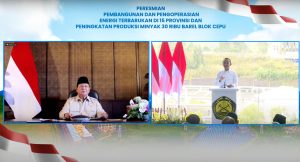Jakarta – The governments of Indonesia and Singapore have officially signed a Letter of Intent (LOI) to cooperate on cross-border carbon capture and storage (CCS) activities. The governments view this agreement as essential in addressing global climate change and promoting sustainable economic growth in the Southeast Asian region.
According to Keith Tan, Deputy Secretary (Industry) of Singapore’s Ministry of Trade and Industry, cross-border carbon capture and storage is an emerging solution in Asia. In addition, it supports Singapore’s transition to a low-carbon future. He emphasised that with this agreement, Singapore and Indonesia can become pioneers in accelerating the implementation of cross-border CCS projects in the Southeast Asian region.
Deputy for Maritime Sovereignty and Energy at Indonesia’s Coordinating Ministry for Maritime Affairs and Investment, Jodi Mahardi, explained that this cooperation not only enhances Indonesia’s commitment to leading environmental responsibility in the region but also demonstrates Indonesia’s proactive approach in utilising innovative technologies for sustainable growth.
This agreement comes under Presidential Regulation N 14 Year 2024 on implementing Carbon Capture and Storage Activities. This regulation provides access to carbon storage operators to provide international carbon storage capacity.
“This step is in line with international views that recognise the important role of CCS to achieve net zero emissions by mid-century and reduce the effects of global warming,” Mahardi said in an official statement.
In the LOI, Indonesia and Singapore underscore the importance of CCS as an effective decarbonisation method for hard-to-emit industrial sectors, such as the energy sector, chemical industry, and power generation. A working group comprising government officials from both countries will collaborate to formulate a legally binding bilateral agreement to enable cross-border transportation and storage of carbon dioxide between the two countries. (Hartatik)













